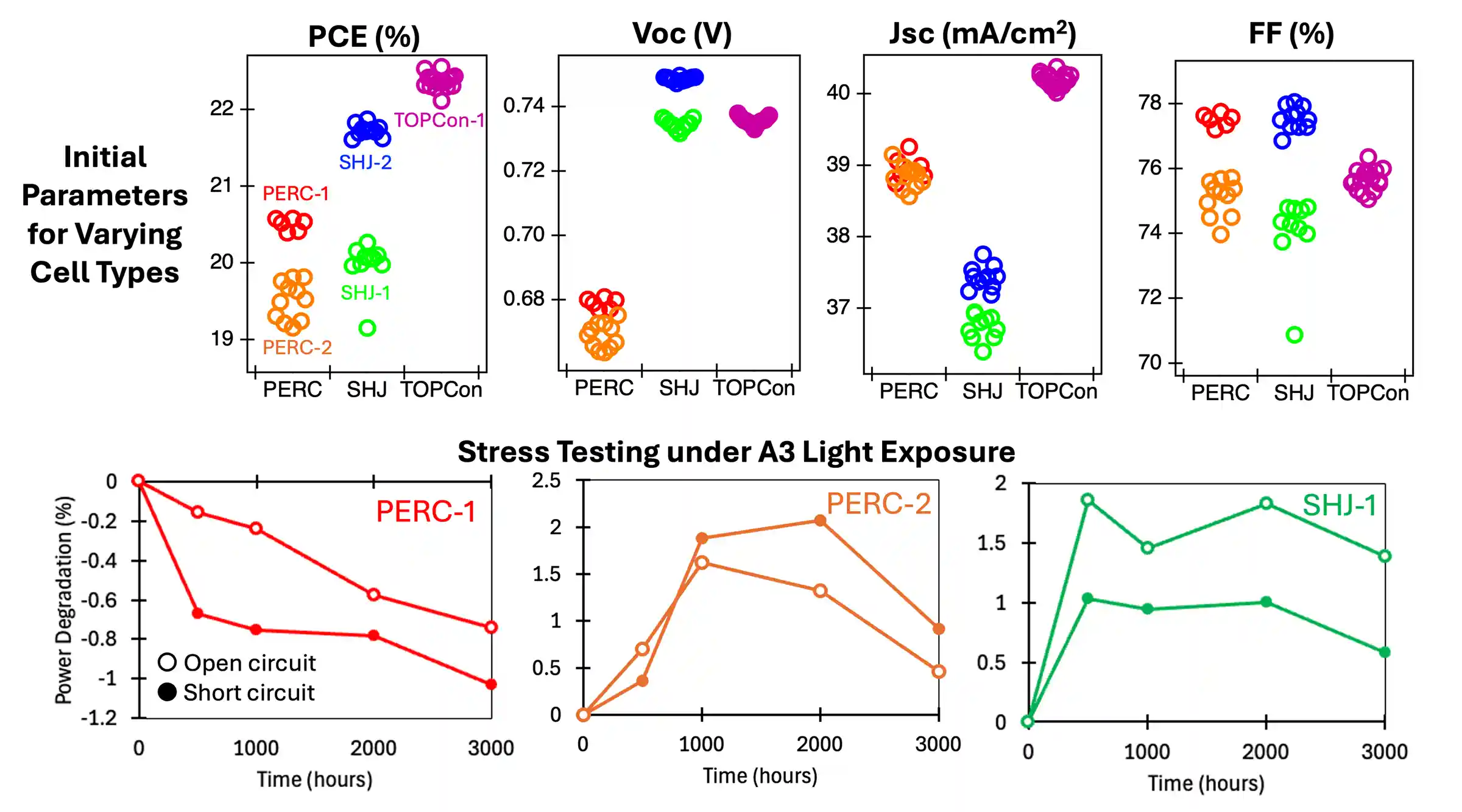Accelerated Stress Testing To Deconvolute Simultaneous But Distinct Degradation Pathways Under Ultraviolet Illumination
DuraMAT addresses simultaneous but distinct degradation pathways in modern photovoltaic (PV) modules that occur under illumination with ultraviolet (UV)-containing light.
We study new encapsulant formulations and cell technologies, including passivated emitter and rear contact (PERC), tunnel oxide passivated contact (TOPCon), and silicon heterojunction with intrinsic thin layer (SHJ). In particular, SHJ and TOPCon cells are appealing due to their increased efficiencies, which are achieved with highly effective passivation strategies. These efficiencies enable higher open-circuit voltages compared to PERC. However, recent studies suggest that durability under UV light may become a concern for these advanced cell designs (see Sinha et al. 2022 under “Learn More”).
We test PERC, SHJ, and TOPCon cells from several manufacturers under UV-containing light. To decouple the addition effects of the encapsulant, we test bare cells in UV-transmitting glass holders separately from the encapsulant coupons. Once we understand the separate degradation mechanisms of cells and encapsulants, we will evaluate the combination of these components in mini modules. Thus far, depending on the cell type, we have observed both power degradation and power enhancement for full-spectrum UV-containing light exposure of up to 3,000 hours at 65°C air temperature (90°C black panel). These results can vary even for a given cell type. SHJ and PERC cells may exhibit efficiency improvements or declines depending on the manufacturer and stress time.
New silicon PV cell technologies may degrade under UV-containing light. We strive to inform appropriate testing conditions and identify degradation pathways.
Core Objective
Disruptive Acceleration Science
Team Members
Dana Kern, Peter Hacke, David Miller, Rebecca Wai, Dennice Roberts, Steve Johnston, Xavier Hanna, Kent Terwilliger, Rachael Arnold, and Jimmy Newkirk at the National Renewable Energy Laboratory (NREL)
Impact
By varying the UV testing conditions (including spectrum, temperature, electrical bias, and, eventually, sequential stressors), we hope to reveal a comprehensive picture of UV degradation pathways and the appropriate conditions for elucidating these effects. Furthermore, we hope to clarify how newer cell designs like SHJ and TOPCon may degrade differently from PERC cells. The results will inform stress testing procedures and provide a valuable dataset for extracting activation energies to extrapolate the effects of UV degradation through a 50-year timescale.
Learn More
Background can be found from the results in an earlier DuraMAT project:
Sinha, Archana, Jiadong Qian, Stephanie Moffitt, Katherine Hurst, Kent Terwilliger, David Miller, Laura Schelhas, and Peter Hacke. 2023. “UV-Induced Degradation of High-Efficiency Silicon PV Modules With Different Cell Architectures.” Progress in Photovoltaics: Research and Applications 31 (1): 36–51.
Contact
To learn more about this project, contact NREL's Dana Kern and Peter Hacke.

Initial current-voltage (IV) parameters are shown for various cell technologies and manufacturers, including power conversion efficiency (PCE), open-circuit voltage (Voc), short-circuit current density (Jsc), and fill factor (FF). SHJ and TOPCon cells exhibit higher efficiencies than PERC due to improved open-circuit voltages achieved with advanced passivation strategies. Stress testing under light exposure shows power degradation in PERC-1 but initial power improvement in PERC-2. SHJ-1 also shows an initial power increase, highlighting the complexities of light-induced stress testing methods. Images by Dana Kern, Peter Hacke, David Miller, Rebecca Wai, Dennice Roberts, Steve Johnston, Xavier Hanna, Kent Terwilliger, Rachael Arnold, and Jimmy Newkirk, NREL